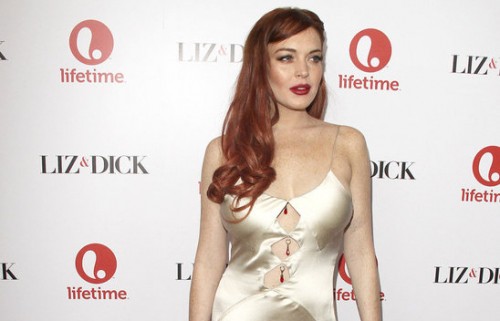IN 2004, Lindsay Lohan was at the beginning of what looked to be a long and promising career. Coming off the commercial success of two Disney films Freaky Friday and Confessions of a Teenage Drama Queen, Lohan was then cast in the Tina Fey-scripted comedy Mean Girls, a movie both critically acclaimed and commercially successful. Her turn in Mean Girls cemented her as a star and a three-peat host on SNL, while her performances in all three movies made her a fixture in the teen-fueled MTV Movie Awards and Teen Choice Awards in 2004 and 2005, where she won numerous statuettes.
During her heady ascent, a studio engineer I know worked on Lindsay Lohan’s debut album, Speak. The album, which credits 65 different engineers, producers and musicians—never a good sign—was recorded on the set of the presciently-titled Herbie, Fully Loaded; Lohan sang in her trailer after the movie wrapped for the day, mostly in the middle of the night. Speak was rushed into stores before Christmas, hoping to capitalize on whatever momentum Lohan—and her already-growing gossip dossier—had. It was not well received by critics, though made it to number four on the Billboard 200 chart.
It was a story my friend told that made me sympathetic towards Lohan. As one of the multiple engineers, he had access to her vocal tracks, including the chatter at the end of takes. Lohan was learning the lyrics on the fly—not surprising since she wasn’t recording as a professional musician with time in the studio to work out her performance—and kept flubbing them. After multiple attempts, she admitted wearily, “I don’t even like this song.” She was seventeen years old.
That Lohan recorded her vocals in a movie trailer, was credited with “co-writing” though she passed through the hands of multiple producers, and had her “product” rushed to stores under extreme time constraints, indicates what I have come to think of as “The Board Room Decision.” In the Board Room Decision, invisible forces behind closed doors cynically decide how to invest the celebrity capital of their young charges, with the objective of wringing out as much money as possible before that capital inevitably declines. Though Lohan has been a more spectacular example of the Board Room Decision than most, the entertainment industry is littered with the carcasses of young stars who were steered into roles for which they were unprepared, no serious effort undertaken to foster either skill or artistry in their craft, nor given support systems to guide them—their masters understanding that celebrity is the product, and talent is desirable but unnecessary for success.
Lohan’s story since Speak has become the bread and butter of the entertainment rags, as she has taken her early fame and run amok with it. Starting with starlet feuds, she wended into well-publicized alcohol frenzies, DUIs, car accidents and mug shots. Her love life, such as it was, wandered through traveled hollows, swapping boyfriends with the likes of Hilary Duff and Paris Hilton more than once. It wasn’t until she began “not dating” Samantha Ronson that she seemed happy—though they had so many public fights it became impossible to tell one spectacle from the next. In the wings were constant, horrible and very public battles between her parents behaving like bratty children, with Lohan in the center. Most recently, Lohan’s bank accounts were seized by the IRS for back taxes while Lohan was simultaneously attacked by the lawyer Gloria Allred, star-fucker extraordinaire, who was retained by a psychic accusing Lohan of assault in a night club. Reading about Lohan over the years is like reading Nathaniel West’s Day of the Locust, with LiLo playing all the roles.
She has, as her star has tarnished in recent years, made increasingly bizarre plays for attention and relevance. In one, she agreed to a magazine spread in which she holds a gun to her head; in another she was made up to look like Marilyn Monroe (who she admits to idolizing) in a grotesque example of playing dress up. Finally, losing cachet and reliably unreliable to work with, she was cast in the cliché “I’m not a kid anymore” movie I Know Who Killed Me, in which she took a predictable turn as a stripper in a bid for edginess. Her life was in enough upheaval that in 2010 she was fired from Inferno, the biopic about Linda Lovelace, the porn star from Deep Throat.
But it is her work in the Lifetime Network’s Liz and Dick that concerns me most, and represents what I find particularly appalling in the entertainment industry’s utility of Board Room Decisions. Lifetime (“Television for Women”), never known for creating products of quality, made one of the most transparently cynical decisions I’ve witnessed (in a culture of rampant exploitation) by choosing the hapless and feckless Lohan to play one of the great icons of old Hollywood glamour, Elizabeth Taylor. Admitting that Lohan was “the most insured actress that ever walked on a soundstage,” the producer Larry Thompson clearly hedged his bets: no matter the cost of insuring Lohan, the publicity he generated by banking the un-bankable star was far more valuable to Lifetime than any authenticity the movie might have exhibited portraying the love affair of Taylor and Richard Burton. Lifetime played off the casting of Lohan as a natural fit because of the parallels in their back stories (both women were child stars with interesting love lives, and no strangers to controversy); what Lifetime chose to ignore was that the real Elizabeth Taylor clearly had an innate sense of self-preservation and business savvy which the very fragile Lohan lacks.
If there’s no such thing as bad publicity, then Liz and Dick had it in excess. The night Liz and Dick aired, droves of celebrities, comedians, writers and the general public piled into the Twitter arena to throw stones. The interwebs flickered with daring one-upmanship, as clever people made hay out of Lohan’s misguided and fatal career missteps with scorching witticisms and scintillating quips. People agree on virtually nothing in cyberspace, but that night they rallied under the unifying banner of Lohan’s poor showing in Liz and Dick.
~
In entertainment, one expects the unseemly exploitation of its actors and artists. But the hubris that Lifetime Network exhibited in promoting the charade that LiLo could play Liz in the midst of her continuing slow motion dissolution is more egregious than even the most jaundiced of Board Room Decisions: Lifetime knowingly set up a damaged, unstable young woman, put her on the dais like Carrie at the prom, and then covered her in pig’s blood. It was in lockstep that peers in the entertainment industry and the general public alike would pillory her in a startling display of murder by Twitter. The spectacle continues as Lifetime weighs its options to sue Lohan for the car accident she had during the shooting of Liz and Dick—as though they didn’t know what they were getting in the bargain of signing the “most insured actress that ever walked.”
I would like to believe that Lohan might rehabilitate herself á la Robert Downey, Jr. and return, if not triumphantly, at least with self-respect. I wish she could pry herself from the harsh glow of Hollywood shame for the quiet of a mountain retreat, or the deep archives of a good university library, but I suspect that is not her destiny. She wants too dearly to be Marilyn—or Liz—to realize that to be great, one must be able—to be willing—to be alone, to study, to practice, to be still.
At the premiere of Liz and Dick, held somewhere in the willfully vague “Beverly Hills”, Lohan showed up looking like Norma Desmond; clearly even the fashion consultants have fled Lohan’s world. In a dress too revealing, her hair dyed an unnatural shade of purplish red, it was pulled into what should have been a flattering, Rita Hayworth sweep over her shoulders but instead looked unkempt. Jewels dangled from peek-a-boo cut-outs in her bodice, a tacky embellishment on what might have been a simple, classy dress. But it was her hands which pulled me up short: too old for a woman of 26, much less a star at a premiere of her film, her nails weren’t just unpainted, they were falling apart. With raw cuticles from previous manicures, she couldn’t be bothered to slap on a coat of polish before she headed out.
And finally, with a breathtaking naïvété, she had scribbled a Brigitte Bardot quote on her wrist under the diamond bracelet she wore: “I leave before being left. I decide.” If only that were true.






Wow, lovely defense, Q. I’ve never cared about LiLo until this very moment.
I know her most from a quote she muttered in the midst of one controversy or other. Someone had suggested she talk to Al Gore, of all people, about her problems, and she said, “Yes, I’ll call him. Al Gore will help me.” There was something startlingly sad about that line. Al Gore, of course, didn’t know her.
When I heard the story about her recording, I set aside a small piece of my black heart for her. But the Liz and Dick fiasco was such a horror show, such intense schadenfreude, I felt like Lifetime was culpable for whatever happened next.
I’m going to go on record to say that Lifetime would consider making the LiLo biopic if LiLo’s decline ends where it seems likely. They’re just that cynical.
In other news, Hi, Art!
Our best to you and yours, Q.
Beautiful piece, Q. Honestly, I’ve intentionally been avoiding any articles about her lately and vowed complete abstinence after the premier or Liz and Dick. I’m glad I read this essay, but I truly only did so because you wrote it, not because it was about LiLo. However, it has reinforced a gut feeling that has been building for a while now: that I can’t be a gleeful spectator in another human being’s demise. It all makes me too sad.
Unless the demise is that of your greatest enemy (which in Dr. January’s case, is Professor February) then yes, I agree wholeheartedly.
Dr. January? Who is hiding behind this clever nom de guerre?!
A man without a face, and a face without a man.
Damn. That’s sad. How do you, like, date?
I drink a lot, and look at shadows on the wall.
I know she’s her own worst enemy–she cannot get her shit together for two seconds–but it’s really Lifetime who deserves the booby prize for the disaster that unfolded with L&D.
I believe we should satirize those who deserve it; it’s the universe’s way of empowering the masses and bringing blowhards down to size. But there seems to be a line which was crossed in this case. It’s like kicking a three-legged dog: easy pickings and ultimately pointless. Direct delightfully cruel barbs at those who can stand up straight.
It says a lot about our culture, such as it is, more than it says about LiLo.
Hello, Gloria! You misspelled your own name. Welcome to my world.
“It says a lot about our culture, such as it is, more than it says about LiLo.” No kidding!
I wonder if she has anyone in her life now that she can truly count on.
Goddammit. Thanks, Q. Good thing there’s no way to fix it. :\
Oh wait. Look. FIXED!
I couldn’t agree more. The exploitation of child actors and the joy of watching them publicly deteriorate is indefensible. What happened to compassion?
(Hi, Art!)
Goink, goink, goink!
It’s really awful when their parents are leading the circus. Dina Lohan seems imminently culpable in her daughter’s troubles. Thanks, Laurel.
My parents once led a circus. I was their star performer. And I slept in a tent with bears.
Great piece, Quenby. I don’t know anything about her except the DUI/shoplifting headlines, but I must admit I follow Patton Oswalt on Twitter and was quite amused at the mudslinging glee when I read through it the next morning. What I didn’t realize until now via the picture above of her in blue dress – wow! She is stunning!
“I don’t even like this song.” Incredibly sad.
Patton Oswalt was like an army of one, tweeting furiously, re-tweeting the funniest stuff, but dang. Reign it in a little, buddy!
Thanks for reading, Dana! I’m glad to see some familiar faces around here!